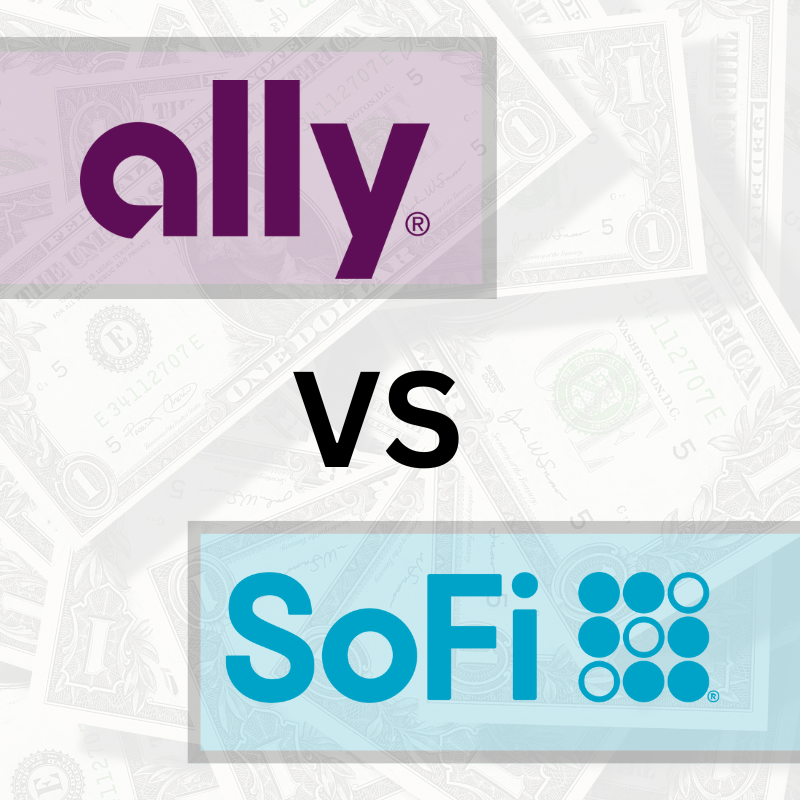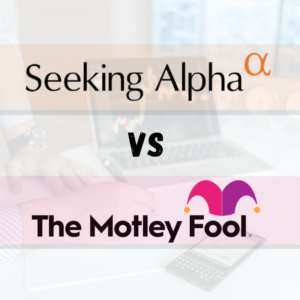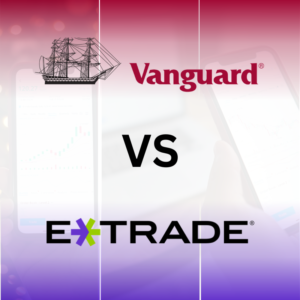When comparing SoFi vs Ally, it’s important to understand what each platform offers to find the best fit for your financial needs. Both SoFi and Ally are popular choices for online banking and investing, each with its unique set of features. This comparison will break down the key aspects of each platform, including account types, interest rates, fees, and more, to help you make an informed decision. Whether you’re looking for high-yield savings, investment tools, or loan services, this guide will help you determine which one aligns better with your financial goals.
Table of Contents
SoFi vs Ally: Account Types Offered
When comparing SoFi vs Ally, it’s essential to look at the range of account types each platform offers to meet various financial needs. Both SoFi and Ally provide a variety of accounts, but they cater to different preferences and goals.
SoFi Account Types:
- SoFi Checking and Savings: SoFi offers a combined checking and savings account with competitive interest rates and no account fees. It includes features like early direct deposit, automatic savings, and cash-back rewards.
- SoFi Invest: This includes active investing, automated investing (robo-advisor), and crypto trading. SoFi allows users to trade stocks, ETFs, and cryptocurrencies with no commissions.
- SoFi Credit Card: SoFi’s credit card offers cash-back rewards that can be redeemed directly into SoFi accounts.
- SoFi Loans: Personal loans, student loans, home loans, and mortgage refinancing are available with competitive rates and flexible terms.
Ally Account Types:
- Ally Bank Accounts: Ally offers high-yield savings accounts, interest-bearing checking accounts, and money market accounts with no monthly maintenance fees. Their savings account is known for its competitive APY.
- Ally Invest: Ally provides self-directed trading and managed portfolios. Users can trade stocks, ETFs, options, and mutual funds, with a focus on commission-free trading.
- Ally Credit Card: While not as prominent as SoFi’s, Ally offers a cash-back credit card that integrates seamlessly with their banking services.
- Ally Loans: Ally focuses mainly on auto loans, offering competitive rates and flexible financing options. They also provide home loans and personal loans, though with fewer options than SoFi.
| Account Type | SoFi | Ally |
|---|---|---|
| Checking & Savings | Combined account with competitive APY, no fees | Separate high-yield savings and checking accounts, no fees |
| Investment Accounts | Active investing, robo-advisor, crypto trading | Self-directed trading, managed portfolios |
| Credit Card | Cash-back rewards card integrated with SoFi accounts | Cash-back card with integration to Ally accounts |
| Loans | Personal, student, home loans, mortgage refinancing | Auto loans, home loans, personal loans |
| Other Accounts | N/A | Money market accounts |
SoFi vs Ally: Interest Rates and APYs
When evaluating SoFi vs Ally, interest rates and APYs (Annual Percentage Yields) are crucial factors to consider, especially for savings and investment accounts. These rates can significantly impact the growth of your savings over time.
SoFi Interest Rates and APYs:
- SoFi Checking and Savings: SoFi offers a competitive APY on its combined checking and savings account, often higher than traditional banks. The exact rate can vary, but SoFi frequently offers promotions that can boost the APY for new customers.
- SoFi Invest: For investment accounts, SoFi doesn’t offer interest rates in the traditional sense. However, it provides commission-free trading for stocks, ETFs, and crypto, allowing users to maximize their investment returns without additional fees.
- SoFi Loans: Interest rates on SoFi loans, including personal, student, and home loans, are generally competitive and vary based on creditworthiness, loan terms, and other factors. They often offer rate discounts for automatic payments.
Ally Interest Rates and APYs:
- Ally Savings Accounts: Ally is known for its high-yield savings account, which typically offers a higher APY than the national average. The APY can change based on market conditions, but Ally consistently ranks among the top for competitive rates.
- Ally Checking Accounts: Ally’s interest-bearing checking account also offers a modest APY, allowing users to earn interest on their checking balances.
- Ally Invest: Similar to SoFi, Ally Invest doesn’t offer direct interest rates but provides a range of commission-free trading options, helping users grow their investments efficiently.
- Ally Loans: Ally’s auto loans come with competitive interest rates that vary based on the borrower’s credit score and the term of the loan. They also offer mortgage loans with various rate options.

SoFi vs Ally: Fees and Charges
When comparing SoFi vs Ally, understanding the fees and charges associated with each platform is crucial. Both SoFi and Ally are known for their low-fee structures, but there are some differences worth noting.
SoFi Fees and Charges:
- Checking and Savings Account: SoFi offers its combined checking and savings account with no monthly maintenance fees, no minimum balance requirements, and no overdraft fees. Additionally, SoFi reimburses ATM fees at certain networks, making it cost-effective for everyday banking.
- Invest Accounts: SoFi Invest allows commission-free trading for stocks, ETFs, and cryptocurrencies, making it an attractive option for fee-conscious investors. There are no account management fees for SoFi’s robo-advisor service.
- Loans: SoFi personal and student loans come with no origination fees or prepayment penalties. However, some loan types may have late payment fees, so it’s important to review the loan agreement details.
Ally Fees and Charges:
Loans: Ally’s auto loans have no application fees or prepayment penalties, but late payment fees may apply. Mortgage loans come with standard closing costs, which vary depending on the loan type and amount.
Bank Accounts: Ally offers its high-yield savings, checking, and money market accounts with no monthly maintenance fees and no minimum balance requirements. For checking accounts, there are no fees for overdrafts if enrolled in Ally’s Overdraft Protection Transfer service.
Invest Accounts: Ally Invest provides commission-free trading for U.S. stocks, ETFs, and options. However, options trading has a small per-contract fee. Managed portfolios have no advisory fees for a basic account, but there is a fee for enhanced portfolios that include additional features.
SoFi vs Ally: Investment Options and Tools
When considering SoFi vs Ally for investment options, both platforms offer a variety of choices to cater to different investment strategies. Whether you’re a hands-on investor or prefer automated tools, SoFi and Ally provide robust platforms to suit your needs.
SoFi Investment Options and Tools:
- Active Investing: SoFi allows users to trade stocks, ETFs, and cryptocurrencies with no commissions. It offers a user-friendly platform suitable for beginners and more experienced investors.
- Automated Investing: SoFi’s robo-advisor service creates and manages a diversified portfolio based on your risk tolerance and financial goals. This service has no management fees and automatically rebalances your portfolio.
- Crypto Trading: SoFi supports cryptocurrency trading, enabling users to buy and sell popular digital currencies like Bitcoin and Ethereum within the same platform.
- Investment Resources: SoFi provides educational resources, including articles, webinars, and market news, helping users make informed investment decisions.

Ally Investment Options and Tools:
Investment Tools: Ally Invest includes advanced trading tools, such as a profit/loss calculator, probability calculator, and research insights to assist in making strategic investment decisions.
Self-Directed Trading: Ally Invest offers commission-free trading for U.S. stocks, ETFs, and options. Its platform includes advanced research tools and customizable charting, appealing to more experienced traders.
Managed Portfolios: Ally’s robo-advisor service offers managed portfolios with no advisory fees for basic accounts. Users can choose from various portfolio types based on their investment goals and risk tolerance.
Mutual Funds and Bonds: Unlike SoFi, Ally offers access to a wide range of mutual funds and fixed-income securities like bonds, providing more options for portfolio diversification.

SoFi vs Ally: Loan Services
When comparing SoFi vs Ally, loan services are a key consideration, especially for individuals looking for flexible financing options. Both platforms offer a variety of loan types, but they cater to different needs and customer profiles.
SoFi Loan Services:
- Personal Loans: SoFi offers personal loans with competitive interest rates and no origination fees. These loans can be used for various purposes, such as debt consolidation, home improvement, or major purchases. Borrowers benefit from fixed rates and flexible terms ranging from 2 to 7 years.
- Student Loans and Refinancing: SoFi provides student loans for undergraduates, graduates, and parents, along with student loan refinancing options. They offer competitive rates and the ability to consolidate multiple loans into one, potentially lowering the overall interest rate.
- Home Loans and Mortgage Refinancing: SoFi offers home loans with options for primary homes, second homes, and investment properties. They also provide mortgage refinancing with competitive rates, which can help lower monthly payments or shorten the loan term.
- No Fees: One of the standout features of SoFi’s loans is the lack of fees—no origination fees, no prepayment penalties, and no late fees, making them a cost-effective choice for borrowers.
Ally Loan Services:
Transparency and Flexibility: Ally is transparent about its fees and interest rates, with no hidden costs. However, unlike SoFi, some loans may come with origination or late fees, so it’s important to review the terms.
Auto Loans: Ally is well-known for its auto financing services. They offer competitive rates and flexible terms for both new and used vehicles. Additionally, Ally provides an online pre-approval process, making it easier for customers to understand their financing options before visiting a dealership.
Home Loans and Mortgage Services: Ally offers a variety of home loan options, including fixed-rate and adjustable-rate mortgages. They also provide jumbo loans for higher-priced homes. Ally’s mortgage services include an online application process and the ability to track the loan status through their digital platform.
Personal Loans: While Ally doesn’t focus heavily on personal loans, they offer options through a partnership with other lending institutions. These loans can be used for purposes like home improvements or consolidating debt, with varying rates and terms based on the lender.

SoFi vs Ally: Sign-Up Process and Requirements
Understanding the sign-up process and requirements for SoFi vs Ally can help you decide which platform suits you best. Both SoFi and Ally offer streamlined, user-friendly processes for opening accounts, but they have some differences in requirements and steps.
SoFi Sign-Up Process and Requirements:
- Account Opening: To open an account with SoFi, you’ll start by visiting their website or using the mobile app. The process is straightforward, requiring basic personal information such as your name, address, Social Security number, and employment details.
- Verification: SoFi may ask for additional documentation to verify your identity, such as a government-issued ID. This step helps ensure the security of your account and personal information.
- Funding Your Account: After verification, you can fund your SoFi account via bank transfer. There is no minimum deposit required to open most accounts, making it accessible for a wide range of users.
- Loan Applications: For loans, the process involves providing more detailed financial information, including income and credit history. SoFi performs a soft credit check initially, so you can see your rates without affecting your credit score. A hard credit inquiry occurs only when you decide to proceed with the loan.
- Approval Time: The approval process is typically quick, with most accounts being set up within minutes and loans being approved within a few days, depending on the type.
Ally Sign-Up Process and Requirements:
Approval Time: Opening a bank account with Ally usually takes just a few minutes. Loan approvals can take longer, especially for mortgages, which might involve more documentation and verification.
Account Opening: Ally’s sign-up process is also accessible through their website or mobile app. You’ll need to provide personal details like your name, address, Social Security number, and employment information.
Verification: Ally, like SoFi, may require additional verification through a government-issued ID or other documents. This step ensures your information is secure and compliant with banking regulations.
Funding Your Account: Ally’s bank accounts typically have no minimum deposit requirements, making it easy to get started. You can fund your account through a transfer from an existing bank account.
Loan Applications: For auto and home loans, Ally’s application process involves submitting detailed financial information and undergoing a credit check. Ally provides an online pre-approval option for auto loans, giving you an idea of your financing terms before committing.

SoFi vs Ally: Security and Privacy
When comparing SoFi vs Ally, security and privacy are paramount. Both platforms prioritize protecting users’ data and financial information through advanced security measures and privacy practices.
SoFi Security and Privacy:
- Encryption: SoFi uses industry-standard encryption to protect user data during transmission and storage. This ensures that personal and financial information is safeguarded from unauthorized access.
- Two-Factor Authentication (2FA): To enhance account security, SoFi offers two-factor authentication. This extra layer of security requires users to verify their identity through a secondary method, such as a code sent to their mobile device, before accessing their accounts.
- Monitoring and Alerts: SoFi monitors accounts for suspicious activity and provides real-time alerts to users if unusual transactions are detected. This helps users stay on top of their account activity and quickly address any potential issues.
- Privacy Policy: SoFi has a clear privacy policy outlining how they collect, use, and protect user information. They do not sell personal information to third parties, ensuring that your data remains private.
Ally Security and Privacy:
Privacy Policy: Ally’s privacy policy is transparent about how they handle user data. They commit to not selling personal information and allow users to control their privacy settings, giving them the option to opt out of certain data-sharing practices.
Encryption: Ally employs strong encryption methods to secure data, ensuring that user information is protected both during transmission and while at rest. This prevents unauthorized access to sensitive data.
Multi-Factor Authentication (MFA): Ally uses multi-factor authentication to secure accounts, requiring users to provide additional verification, such as a one-time code, to access their accounts. This reduces the risk of unauthorized access.
Continuous Monitoring: Ally continuously monitors accounts for fraudulent or suspicious activities and notifies users immediately if any anomalies are detected. This proactive approach helps protect users from potential fraud.
SoFi vs Ally: Customer Experience and Support
When comparing SoFi vs Ally, customer experience and support are vital aspects to consider. Both platforms strive to provide a seamless user experience and reliable customer support, but they offer these services in different ways.
SoFi Customer Experience and Support:
- User Interface: SoFi offers a modern, intuitive interface on both its website and mobile app. The design is user-friendly, making it easy for users to navigate their accounts, make transactions, and access various financial tools.
- Educational Resources: SoFi provides a wealth of educational resources, including articles, webinars, and financial planning tools. This is particularly helpful for users who want to learn more about managing their finances or making informed investment decisions.
- Customer Support: SoFi offers customer support through multiple channels, including phone, email, and live chat. They also have a comprehensive help center on their website with FAQs and guides. Support is generally available during extended hours on weekdays and weekends.
- Community and Networking: One unique aspect of SoFi is its community-driven approach. Members have access to events, career coaching, and networking opportunities, adding value beyond just financial services.
Ally Customer Experience and Support:
- User Interface: Ally’s platform is known for its clean, straightforward interface. Both the website and mobile app are designed with user-friendliness in mind, providing easy access to accounts, tools, and services. The platform includes advanced features for investors, such as customizable charts and trading tools.
- Educational Resources: Ally offers a variety of educational content, including articles, webinars, and calculators, to help users make informed financial decisions. Their resources cover a range of topics, from budgeting to investing, making it a valuable learning hub.
- Customer Support: Ally provides 24/7 customer support through phone and live chat, ensuring users can get assistance whenever they need it. They also have a detailed FAQ section and online guides to help users find answers quickly.
- Virtual Assistant: Ally offers a virtual assistant feature that can help users with common tasks, such as finding information on the website or completing transactions, enhancing the overall customer experience.
SoFi vs Ally: Pros and Cons Summary
SoFi Pros and Cons
| Aspect | SoFi Pros | SoFi Cons |
|---|---|---|
| Account Types | Combined checking and savings | Limited mutual funds and bonds |
| Interest Rates/APYs | Competitive APYs | APYs vary with promotions |
| Fees | No fees on accounts, free investing | Some loan fees |
| Investments | Commission-free, crypto options | Fewer research tools |
| Loans | No origination fees, competitive rates | Limited auto loans |
| Sign-Up | Quick, no minimum deposit | Soft credit check for loans |
| Security | Strong encryption, 2FA | Extra verification steps |
| Support | Modern interface, educational resources | Limited support hours |
Ally Pros and Cons
| Aspect | Ally Pros | Ally Cons |
|---|---|---|
| Account Types | Variety, includes money market | No combined checking/savings |
| Interest Rates/APYs | High-yield savings | Slightly lower than SoFi |
| Fees | No monthly fees, low trading fees | Options have per-contract fee |
| Investments | Advanced tools, diverse products | Fees for enhanced portfolios |
| Loans | Strong auto and home loans | No direct personal loans |
| Sign-Up | Easy, auto loan pre-approval | Longer loan approval process |
| Security | Robust security, MFA | Stricter loan verification |
| Support | 24/7 support, user-friendly | No in-person service |
SoFi vs Ally: Conclusion
In the SoFi vs Ally comparison, both platforms offer a range of financial services that cater to different needs. SoFi stands out with its integrated checking and savings account, commission-free investing, and a variety of loan options, making it a great choice for those looking for an all-in-one financial solution. It’s particularly appealing to users who prioritize a modern interface and community-driven benefits.
On the other hand, Ally shines with its high-yield savings account, advanced investment tools, and strong auto loan services. It’s ideal for users who want a more traditional banking experience with the added convenience of 24/7 customer support and a variety of account types. While Ally may have slightly lower APYs in some areas, it compensates with a comprehensive suite of services and features.
Ultimately, the choice between SoFi and Ally depends on your individual financial goals and preferences. If you’re looking for a more integrated experience with a focus on innovation, SoFi may be the better fit. However, if you value a more established banking platform with a wide range of options and continuous support, Ally could be the way to go.






Pingback: TurboTax Desktop vs Online – A Complete Comparison for 2024 Tax Season - Journey to Cash: Your Guide to Financial Freedom